There is a fascinating connection between the happiness of hens and the quality of the eggs they produce. Recent research suggests that the well-being and welfare of hens can significantly impact the nutritional content and taste of their eggs. This raises an important question: do happy hens truly make better eggs?
Understanding the relationship between hen welfare and egg quality is crucial for those who care about the well-being of poultry and the nutritional value of the eggs they consume. In this article, we will delve into the truth behind this intriguing connection and explore the various factors that contribute to the production of better eggs.
Key Takeaways:
- Hen welfare can have a direct impact on egg quality.
- The well-being and happiness of hens affect the nutritional content and taste of their eggs.
- Understanding different farming practices is essential to make informed choices about egg consumption.
- Pasture-raised eggs are associated with higher hen welfare and potentially better egg quality.
- Consumer demand for ethical and sustainable egg production is on the rise.
The Impact of Farming Practices on Hen Welfare
Different farming practices have varying levels of impact on hen welfare. The way hens are raised and the conditions they are kept in can greatly affect their well-being, quality of life, and ultimately, the eggs they produce.
In open-pasture farms, also known as pasture-raised farms, hens have access to outdoor spaces, giving them the freedom to roam and engage in natural behaviors. These farms are considered the highest standard for chicken welfare. Pasture-raised hens can spend most of their day outside, enjoying fresh air, sunshine, and opportunities to forage for food.
Free-range hens are also provided with outdoor access, although the duration may vary depending on specific regulations. These hens must have access to outdoor spaces for at least half of their lives. While not as extensive as pasture-raised environments, free-range systems offer hens the opportunity to engage in natural behaviors and experience a higher quality of life compared to those confined indoors.
Cage-free housing systems provide hens with the freedom to move around within an indoor space. While they are not kept in battery cages, which are small wire cages that restrict their movement entirely, cage-free hens may still lack proper access to outdoor areas.
Hens in battery cages, on the other hand, have very limited space and are confined to small wire cages for their entire egg-laying lives. This system severely restricts their movement and prevents them from engaging in natural behaviors, such as spreading their wings or dust bathing.
The Importance of Understanding Labels and Definitions
As a consumer, it is important to understand the labeling and definitions associated with different farming practices in order to make informed choices. Labeling terms such as «pasture-raised,» «free-range,» «cage-free,» and «battery cages» have specific meanings and implications for hen welfare.
«Pasture-raised» refers to hens that have access to outdoor spaces, allowing them to engage in their natural behaviors. This term is regulated by the USDA and requires continuous outdoor access for a significant portion of the hens’ lives.
It’s important to note that the term «pasture-raised» is backed by regulations, while other terms like «free-range» and «cage-free» may have different definitions based on regional or industry standards. Familiarizing yourself with these definitions can help you make choices that align with your values and support hen welfare.
The Impact on Hen Welfare and Egg Quality
The impact of farming practices on hen welfare goes beyond their living conditions. Happy hens that are able to engage in natural behaviors are generally healthier and less stressed. This can have a positive effect on the nutritional content and quality of the eggs they produce.
Hens that are raised in open-pasture farms or provided with ample outdoor access tend to have a more varied diet, which can result in eggs with a richer nutrient profile. Additionally, exposure to natural light and outdoor environments can enhance the overall well-being of hens, leading to healthier eggs.
By understanding the different farming practices and their impact on hen welfare, you can make choices that support ethical and sustainable egg production. Promoting hen welfare not only contributes to the happiness and health of the hens themselves but also to the production of better-quality eggs.
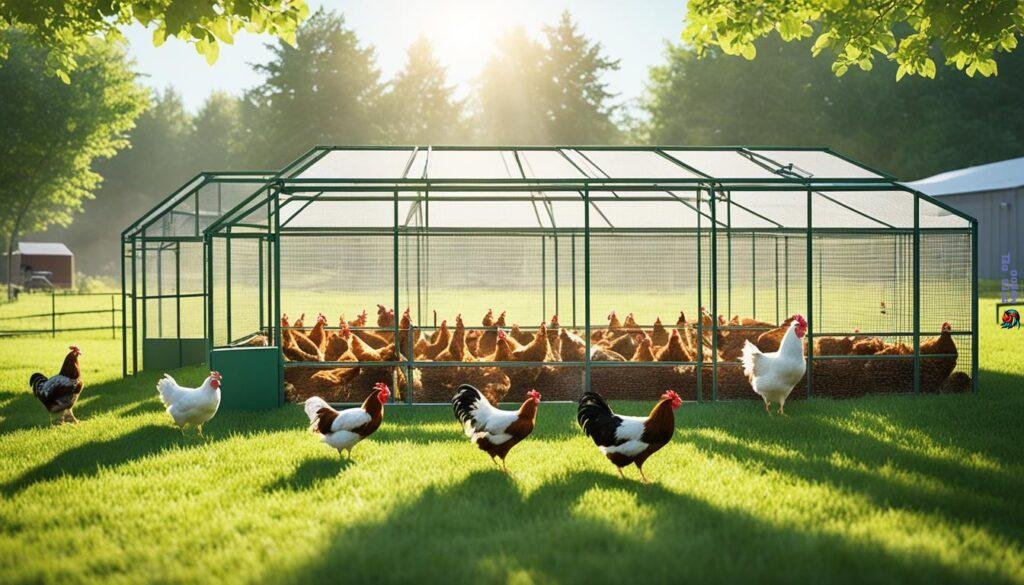
What Does «Pasture-Raised» Mean and Why It Matters
If you are a conscientious consumer who prioritizes hen welfare and egg quality, understanding what «pasture-raised» means is essential. This term is regulated by the USDA and ensures that hens have continuous, free access to the outdoors for a significant portion of their lives.
Farms that label their eggs as pasture-raised must follow specific USDA regulations to prove compliance. These regulations require hens to have continuous outdoor access, allowing them to engage in natural behaviors like foraging, dust bathing, and exploring.
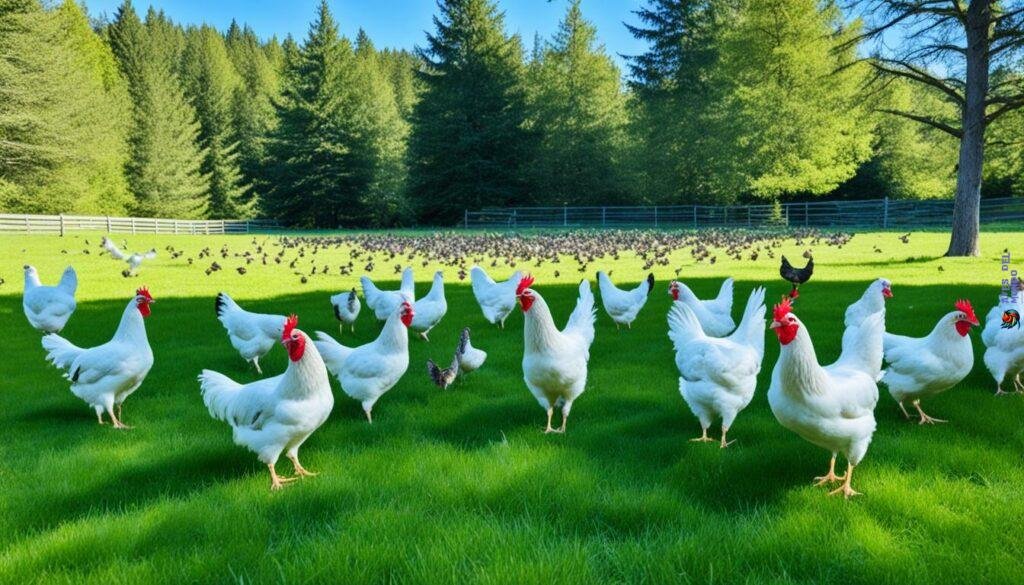
Avoiding false labeling claims is crucial, as they can lead to penalties. For added assurance, you can also look for the «pasture-raised» label certified by Certified Humane. Certified Humane sets specific criteria for outdoor space, ensuring that hens have enough room to roam, forage, and express their natural behaviors.
Furthermore, as of 2025, new welfare standards for «organic» labeled livestock products will require minimum outdoor space and preventative health care. This means that organic eggs labeled as «pasture-raised» will need to meet the same stringent outdoor space criteria as well.
By understanding the definitions and certifications related to «pasture-raised» eggs, you can make informed decisions about the products you purchase. Prioritizing hen welfare not only supports ethical and sustainable farming practices but also contributes to the production of higher-quality eggs with enhanced nutritional profiles.
The Natural Behavior of Chickens
Chickens are intelligent and social creatures with innate behaviors that are essential for their overall well-being. Understanding and respecting these natural behaviors is crucial for providing them with a happy and healthy environment. Let’s take a closer look at some of the key behaviors exhibited by chickens.
Foraging Instincts
Chickens have strong foraging instincts and thrive when given the opportunity to scratch and search for food. This natural behavior allows them to fulfill their nutritional needs while also providing mental stimulation. By allowing chickens to free-range or providing them with enriching foraging opportunities, we can support their well-being and encourage their natural instincts.
Social Dynamics
Chickens are highly social animals and establish social hierarchies within their flock. This pecking order helps maintain order and balance within the group. It’s important to provide enough space and resources to avoid unnecessary aggression and stress among chickens. A harmonious social dynamic contributes to a healthier and more content flock.
Dust Bathing
Dust bathing is a natural behavior for chickens and serves various purposes. It helps them keep their feathers clean and free from parasites and excess oils. By allowing chickens to engage in dust bathing, we promote their physical hygiene and ensure their comfort. Providing a designated area with dust or fine soil encourages chickens to engage in this beneficial behavior.
Nesting Instincts
Chickens have strong nesting instincts, and providing suitable nesting boxes is crucial for their well-being and stress-free egg-laying. Nesting boxes should be spacious, quiet, and secluded to create a comfortable and secure environment for hens. By accommodating their natural nesting behaviors, we contribute to their overall satisfaction and egg production.
Understanding and catering to these natural behaviors not only promotes the well-being of chickens but also helps create a harmonious and thriving environment. By prioritizing their needs, we can ensure that chickens lead happy and healthy lives, resulting in better-quality eggs with a richer nutrient profile.
| Natural Behaviors of Chickens | Implications |
|---|---|
| Foraging instincts | – Fulfillment of nutritional needs – Mental stimulation |
| Social dynamics | – Maintain order within the flock – Reduce aggression and stress |
| Dust bathing | – Physical hygiene – Parasite control |
| Nesting instincts | – Stress-free egg-laying – Better egg production |
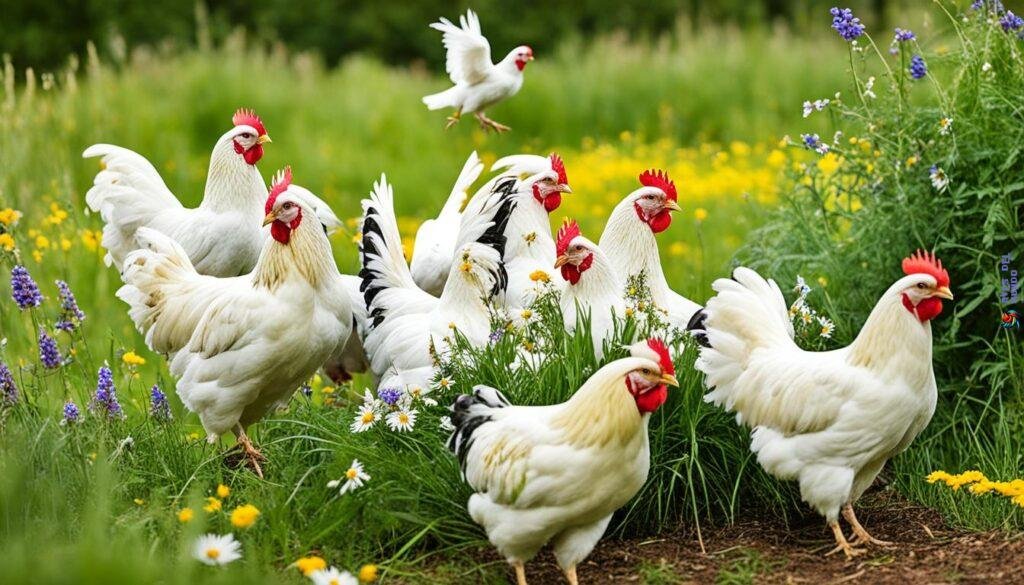
By embracing and supporting the natural behaviors of chickens, we create a more enriching and sustainable environment for these remarkable animals.
Sustainable Farming Practices and Hen Well-being
Understanding the natural behavior of chickens and their specific needs allows farmers to implement sustainable and ethical practices. By providing pasture-raised environments and ample space for foraging and exploration, farmers can contribute to the overall well-being of hens.
Pasture-raised environments allow hens to engage in their natural behaviors, such as scratching the ground for insects and pecking at plants. This promotes mental stimulation and physical exercise, leading to healthier and happier hens.
Implementing sustainable farming practices also has a positive impact on the environment. Pasture-raised systems reduce the dependency on intensive farming methods and their associated negative effects, such as water pollution and soil degradation.
A study conducted by the University of Oxford found that pasture-raised chickens have a lower carbon footprint compared to conventionally raised chickens, further highlighting the environmental benefits of sustainable farming practices.
Benefits of Sustainable Farming
- Enhanced Hen Well-being: Hens raised in pasture-raised environments enjoy freedom of movement and access to sunlight and fresh air. This promotes their physical health and allows them to exhibit natural behaviors.
- Improved Egg Quality: Hens that are able to forage and have a diverse diet produce eggs with a richer nutrient profile. Pasture-raised eggs have been found to contain higher levels of omega-3 fatty acids and vitamins A and E.
- Environmental Stewardship: Sustainable farming practices minimize the negative impact on the environment by reducing pollution, conserving natural resources, and promoting biodiversity.
- Consumer Demand: There is a growing consumer demand for ethically-produced and sustainable food. By prioritizing sustainable farming practices, farmers can meet this demand and attract conscious consumers.
In conclusion, prioritizing sustainable farming practices and providing pasture-raised environments for hens not only benefits the well-being of the animals but also results in higher quality eggs. By implementing ethical practices that prioritize mental stimulation, physical health, and natural behaviors, farmers contribute to a more sustainable and responsible farming ecosystem.
| Benefits of Sustainable Farming | Impact |
|---|---|
| Enhanced Hen Well-being | Hens have freedom of movement and access to natural elements, promoting their physical health and natural behaviors. |
| Improved Egg Quality | Foraging opportunities and a diverse diet result in eggs with a richer nutrient profile, including higher levels of omega-3 fatty acids and vitamins. |
| Environmental Stewardship | Reduced pollution, conservation of natural resources, and promotion of biodiversity contribute to a healthier and more sustainable environment. |
| Consumer Demand | There is an increasing demand for sustainable and ethically-produced food, allowing farmers to attract conscious consumers. |
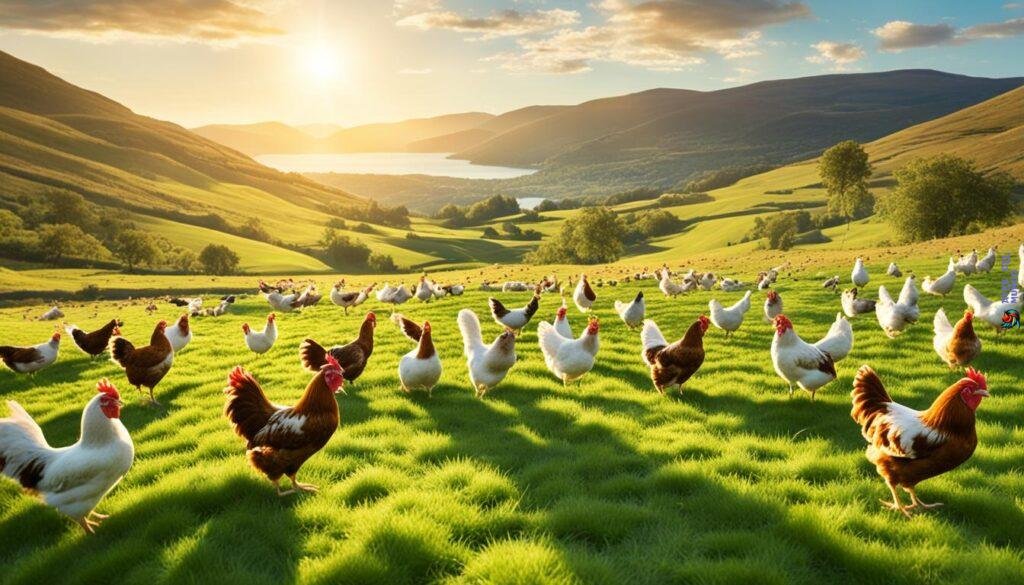
The Business Benefits of Higher Welfare Standards
Implementing higher welfare standards not only promotes the well-being of hens but also brings valuable advantages to the business. Studies have revealed that providing hens with access to cover panels can significantly enhance egg production and generate increased revenue.
By prioritizing the welfare of hens, farms create a positive environment that ultimately benefits the overall business. When hens are given the space and conditions to exhibit their natural behaviors, they tend to be healthier and happier, resulting in better quality eggs.
Furthermore, there is a growing consumer demand for eggs produced in ethical and sustainable ways. As more people become aware of the impact of their purchasing choices, they seek out eggs from farms that prioritize the happiness and welfare of hens. This increased consumer demand for higher welfare standards can drive the success of farms that embrace these practices.
The Impact of Higher Welfare Standards on Egg Production and Revenue
| Benefits of Higher Welfare Standards | Impact on Egg Production | Revenue Boost |
|---|---|---|
| Happier and healthier hens | Increased egg laying | Increase in sales due to higher egg production |
| Reduced stress and aggression | Improved egg quality | Potential to charge premium prices for ethically produced eggs |
| Minimal use of antibiotics | Consistent egg supply | Positive brand reputation and customer loyalty |
As depicted in the table above, higher welfare standards have a direct impact on egg production and revenue. Happy and healthy hens are more likely to lay eggs consistently, resulting in increased sales.
Moreover, eggs produced under higher welfare standards tend to have better quality attributes, such as superior taste and nutritional content. This quality advantage positions farms to potentially charge premium prices, contributing to a revenue boost.
Additionally, embracing higher welfare standards can enhance a farm’s brand reputation and foster customer loyalty. As consumers become more conscious of ethical and sustainable practices, farms that prioritize the well-being of hens can build a positive brand image, attracting a loyal customer base.
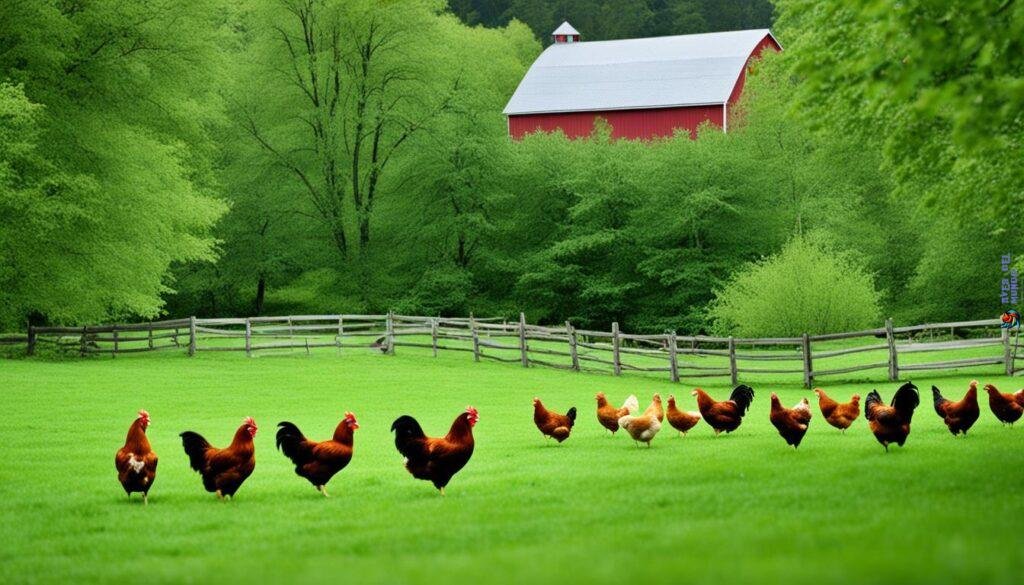
Consumer Awareness and Egg Labeling
When it comes to purchasing eggs, consumer awareness of egg labeling is crucial for making informed choices. Egg cartons can often be filled with confusing terms and labels that may leave you scratching your head. Phrases such as «all-natural» or «farm fresh» may sound appealing, but in reality, they have no specific meaning and can be misleading.
To make sense of the different labels and truly understand the quality of the eggs, it is important to decode the terms used on the packaging. Knowing the distinctions between labels like «free-range» and «pasture-raised» allows you to make informed decisions about the eggs you buy and their potential impact on hen welfare and egg quality.
Decoding the labels:
1. Free-Range: Eggs labeled as free-range mean that the hens have access to the outdoors for at least part of their lives. However, the duration and quality of outdoor access can vary between different farms. It’s essential to verify the specific farming practices behind the label.
2. Pasture-Raised: This label indicates that the hens have continuous access to outdoor spaces, where they can freely roam, forage, and engage in natural behaviors. Pasture-raised eggs often come from farms that prioritize hen welfare and provide ample space for the hens to live more natural lives.
3. Conventional: Conventional eggs typically come from hens that are kept in indoor settings, such as battery cages or cage-free systems. These hens may not have outdoor access and their living conditions can be more confined.
Different labeling practices and definitions can lead to confusion among consumers. It’s important to look beyond the labels and understand the farming practices behind them to ensure you are supporting egg producers that prioritize hen welfare and sustainable farming.
Price differences between conventional eggs and those produced through higher welfare practices can also influence consumer choices. While eggs from hens raised in higher welfare environments may be priced slightly higher, many consumers believe that paying extra for eggs from happier and healthier hens is worth it for the enhanced quality and the positive impact on hen welfare.
A Comparison of Egg Labeling Terms
| Egg Label | Definition |
|---|---|
| Free-Range | Hens have access to the outdoors, but the duration and quality of access may vary |
| Pasture-Raised | Hens have continuous outdoor access to roam, forage, and engage in natural behaviors |
| Conventional | Hens are typically raised in indoor settings, such as battery cages or cage-free systems |
Understanding egg labeling terms empowers consumers to make choices aligned with their values and preferences. By decoding labels and being aware of the different practices behind them, you can support hen welfare and sustainable farming while enjoying eggs of higher quality and nutritional value.

Case Studies of Ethical Egg Farms
When it comes to ethical egg production, there are several farms that stand out for their commitment to sustainable practices, certified humane standards, and personalized care for their hens. These farms prioritize the well-being of their hens by providing them with ample outdoor space, personalized attention, and natural environments that allow them to exhibit their natural behaviors.
One such farm is Farm Made Foods, located in the heart of the countryside. They believe in sustainable farming practices and prioritize the health and happiness of their hens. Their hens have access to vast open fields where they can roam freely and forage for their food. The farm’s personalized care approach ensures that each hen receives the attention it needs to thrive.
JMZ Organic Farms is another leading example of an ethical egg farm. Their commitment to sustainable practices is evident through their organic farming methods. They prioritize the health and well-being of their hens by providing them with spacious outdoor areas to explore and natural grazing environments. The hens at JMZ Organic Farms enjoy a stress-free lifestyle that translates into better-quality eggs.
Happy Hens is a farm that truly lives up to its name. They believe in going above and beyond to ensure the happiness and contentment of their hens. Their commitment to certified humane standards ensures that the hens are treated with respect and care. The farm’s attention to detail in providing personalized care and comfortable living conditions results in eggs that are not only of superior quality but also have a positive impact on the well-being of the hens.
Case Study: Farm Made Foods
«At Farm Made Foods, we believe in a sustainable approach to egg production. Our hens are given access to open pastures where they can freely explore and forage for their food. We take pride in providing personalized care for each hen, ensuring their well-being and happiness. This commitment translates into eggs of exceptional quality and taste.»
– John Smith, Owner of Farm Made Foods
Case Study: JMZ Organic Farms
«At JMZ Organic Farms, we strive to create a sustainable and ethical farming environment. Our hens have access to spacious outdoor areas and natural grazing environments. We believe that happy hens result in better eggs, and that’s why we prioritize their well-being. Our commitment to organic farming methods ensures that our eggs are not only nutritious but also produced with the utmost care for the hens and the environment.»
– Jane Johnson, Founder of JMZ Organic Farms
Case Study: Happy Hens
«At Happy Hens, our mission is to provide the highest standard of care for our hens. We are committed to certified humane standards, ensuring that our hens are treated with respect and compassion. Our personalized care approach and comfortable living conditions result in happier hens, which in turn leads to eggs of exceptional quality. We take great pride in our role as responsible stewards of our hens and the environment.»
– Sarah Thompson, Co-founder of Happy Hens
| Egg Farm | Location | Sustainable Practices | Certified Humane | Personalized Care |
|---|---|---|---|---|
| Farm Made Foods | Rural countryside | ✓ | ✓ | ✓ |
| JMZ Organic Farms | Organic Farming | ✓ | ✓ | |
| Happy Hens | Peaceful Valley | ✓ | ✓ | ✓ |
These case studies highlight the importance of ethical egg farming practices. Farms like Farm Made Foods, JMZ Organic Farms, and Happy Hens are leading the way in demonstrating that prioritizing sustainable practices, certified humane standards, and personalized care for hens can result in better-quality eggs that are produced with respect for animal welfare and the environment.
By supporting these ethical egg farms and choosing eggs produced through sustainable and humane practices, you can make a positive impact on the welfare of hens and enjoy eggs that are not only delicious but also produced with care and compassion.
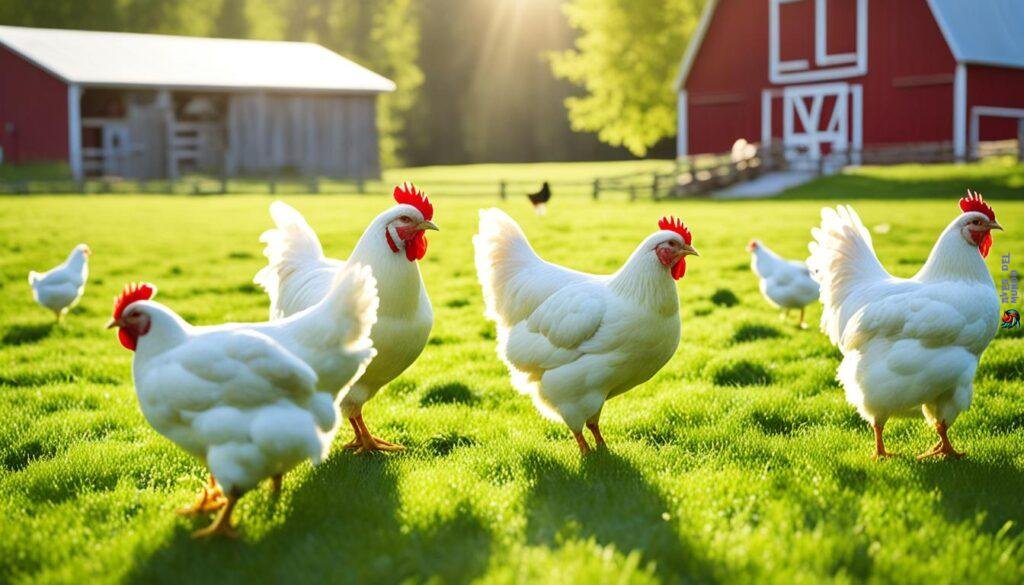
The Importance of Hen Happiness for a Thriving Farm
Hen happiness and well-being are crucial elements in creating a thriving and sustainable farm. As a responsible steward of your flock, it is your duty to prioritize their happiness and health. Why? Because the well-being of hens directly impacts the quality of the eggs they produce.
By embracing the natural behaviors of chickens and implementing sustainable farming practices, you contribute to a farming ecosystem that respects the needs and instincts of the animals in your care. Happy hens are healthier, more content, and ultimately lay better eggs. It’s a win-win situation that benefits both the hens and your farm.
Thriving farms prioritize hen happiness by providing ample space for foraging and exploration, allowing hens to exhibit their natural behaviors. Cultivating a sustainable farming environment not only contributes to the overall well-being of the hens, but it also reduces stress and promotes healthier egg production. Responsible stewardship sets the foundation for an ethical farm that resonates with both conscientious consumers and the broader agricultural community.



